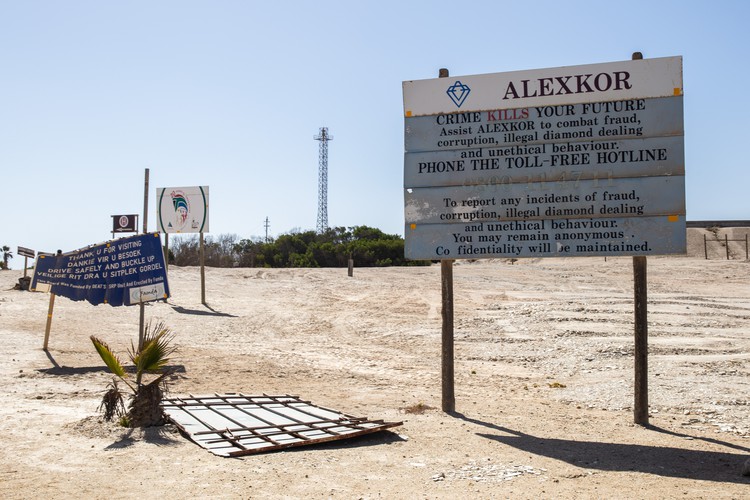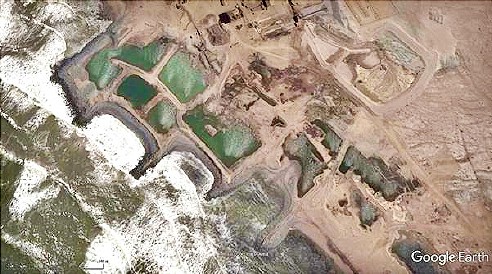Alexkor facing criminal charges over Northern Cape mining operations
Environment department lays charges against state diamond miner over use of “coffer dams”
Alexkor in Port Nolloth is facing criminal charges for buiding coffer dams to hold back the ocean. Photo: Ashraf Hendricks
- The Department of Forestry, Fisheries and the Environment has laid criminal charges against Alexkor for its operations on the Northern Cape coast.
- The Department says the construction of “coffer dams” to hold back the ocean has caused serious damage.
- The Director of Public Prosecutions is assessing the docket.
- Last year Port Nolloth fishers added their voices to those of small scale diamond divers who have complained for years about the dams.
The Department of Forestry, Fisheries and the Environment has laid criminal charges against state-owned diamond mining company Alexkor* for the construction of coffer dams in the diamond-rich beach sections of the Northern Cape coastline.
The “Green Scorpions” environmental inspectorate of Minister Barbara Creecy’s Department has told Alexkor that “serious damage has been caused as a result of the mining methods being used”. The case docket is currently being assessed for prosecution by the Director of Public Prosecutions in the Northern Cape.
Coffer dams are temporary sea walls built to hold back the ocean from the intertidal beach area and shallow surf zones while miners access the diamond-bearing gravels under the beach.
According to documentation related to the case, Alexkor contractors have been using rocks to shore up coffer dam walls since at least 2014. But dumping such “foreign” shore-based material in these sea structures is prohibited by national environmental legislation, and for years there have been vociferous complaints – particularly from small-scale diamond divers – about severe damage to the marine environment.
More recently, in October last year, the traditional small-scale fishing community of Port Nolloth also raised their voices, appealing to Creecy to impose a moratorium on all coffer dam mining and hold a full inquiry into the use of these structures because of their “disastrous consequences for the marine environment and for the livelihoods of the small-scale, artisanal divers and fishers”.
“We as small-scale fishers believe that the cumulative impacts of the illegal construction of these dams using foreign material for at least seven years and the failure to rehabilitate the areas, on top of the prior and continuing beach mining and other mining activities, has pushed this coastline and the resources upon which we rely into a highly impacted state.”
“In the absence of reliable and appropriate monitoring and no baseline, we believe that the coffer dams must please be stopped in line with the precautionary approach,” members of the Aukatowa Small-scale Fisheries Cooperative said in their letter and accompanying report to Creecy.
The cooperative was registered in 2018 to represent the small-scale fishers of Port Nolloth.
Investigation
Because of complaints, the Green Scorpions launched an investigation into the use of coffer dams in May 2020, but progress was slow because of the painstaking legal procedure for enforcing environmental legislation.
Clearly unhappy with what they found in the beach mining areas, the Green Scorpions issued Alexkor with a “Notice of Intention to issue a Compliance Notice” in November 2020 and then a “Pre-compliance Notice” the following month. These were followed by a Warning Letter in February 2021.
In response, Alexkor submitted representations to the Department, including reports by the company’s specialist consultants on the environmental management programme for its mining operations. But these reports were not approved by the Department, and a Compliance Notice dated 29 July 2021 and signed by the Chief Director for Enforcement (Environmental Management Inspector Frances Craigie), was served on Alexkor.
Coffer dam mining operations in 2017. Google Earth Image from the report Amendment of Environmental Management Programmes for Mining Rights 554MRC, 10025MR, 512MRC and 513MRC - Volume 2: Mining Right 554MRC, November 2017 by SLR Consulting in association with Placer Resource Management
Craigie states in the Notice that Alexkor “failed to adhere to the provisions of environmental law in respect of the activities conducted by Alexkor at the Orange River Mouth in the Northern Cape Province” and that “serious damage has been caused as a result of the mining methods being used”.
According to the Notice, Alexkor started operations without the necessary authorisations in terms of the national Integrated Coastal Management Act.
The Notice orders Alexkor to stop using rock for the stabilisation of coffer dams within 15 days of receipt; to submit within 60 days an updated version of its specialists’ report; and to implement actions set out in this amended report in line with the Department’s approval.
Warning
Alexkor was warned that should it fail to comply with the Compliance Notice, it would be committing a further offence.
The company was allowed to make representations to the Department about the requirements in the Compliance Notice, to submit an objection to Creecy, and to ask for the Notice to be suspended.
But last week, the Department told GroundUp in response to questions that Alexkor’s application for suspension of the Notice had been refused. This meant that Alexkor had to comply with the Notice, irrespective of any decision on its objections.
The Department also said that “arrangements are being made” for officials to establish the current status of the Alexkor operations, relative to the suspension decision, and that the mining company had not complied with the instruction to submit an updated report within 60 days.
“The Department will request the Director of Public Prosecutions to consider adding a charge of non-compliance to the Compliance Notice into the ambit of the investigation/docket which has already been referred to them,” it said.
Creecy had announced the criminal charge in a written response to a question in the National Assembly in December. She confirmed that a case had been lodged at the Alexander Bay police station, that the investigation had been completed, and that it had been submitted to the Northern Cape’s Director of Public Prosecutions (DPP) for a decision on whether to prosecute.
Prosecution
Last week, Northern Cape DPP regional communications manager Mojalefa Senokoatsane confirmed to GroundUp that the case docket had been received. He said a decision on prosecution had not yet been taken and he could not give further information on the case “due to its seriousness and as the investigations are ongoing”.
In response to a series of questions sent by GroundUp to Alexkor with an invitation to comment, Alexkor chief executive officer Lemogang Pitsoe replied: “Your email is noted. Kind regards.”
As of Monday this week, Creecy had not responded to the letter and report from the Port Nolloth fishing community requesting a moratorium on coffer dams.
This was confirmed by Christiaan McKenzie, one of the Aukatowa Small-scale Fisheries Cooperative directors. “No, not a word,” he told GroundUp.
* Alexkor is shorthand for the Alexkor Richtersveld Mining Company Pooling and Sharing Joint Venture (PSJV) that was formed between the government-owned mining entity and the Richtersveld community after they had won a huge land restitution claim that included land-based mining rights in 2007. Alexkor has a controlling 51% interest in the joint venture and the community holds 49%.
Support independent journalism
Donate using Payfast

Don't miss out on the latest news
We respect your privacy, and promise we won't spam you.
Next: Young George flood victims miss first day of school
Previous: Covid-19: How South Africa differs from the rest of the continent
Letters
Dear Editor
I was contracted by Conservation International to draft a report on the state of play of West Coast diamond mining in 2016/17. This report provided clear evidence of the illegality and impact of these cofferdams along with other destructive mining impacts. The relevant authorities were notified, notably DMRE and then DAFF, now DEFF. No action was taken.
It is clear that the minerals ministry has little interest or ability to regulate environmental transgressions within its permitted mine sites, as witnessed here and elsewhere on this coast (and nationally - Umfolozi being another recent case). Environmental destruction continues unabated and is accelerating. The activities at MSRs Tormin mine bear this out, along with the continued expansion of other mining activities into highly endangered ecosystems such as the succulent Karoo biomes in the Knersvlakte.
It is clear we need to have improved oversight mechanisms in order to manage and monitor these destructive mining methods. Not only is the environment impacted but so are invaluable ancient rock art sites along the Orange River and elsewhere.
We cannot continue to countenance this corporate vandalism in the name of economic growth. There needs to be active, real-time regulation and sanctions.
© 2022 GroundUp. This article is licensed under a Creative Commons Attribution-NoDerivatives 4.0 International License.
You may republish this article, so long as you credit the authors and GroundUp, and do not change the text. Please include a link back to the original article.
We put an invisible pixel in the article so that we can count traffic to republishers. All analytics tools are solely on our servers. We do not give our logs to any third party. Logs are deleted after two weeks. We do not use any IP address identifying information except to count regional traffic. We are solely interested in counting hits, not tracking users. If you republish, please do not delete the invisible pixel.


